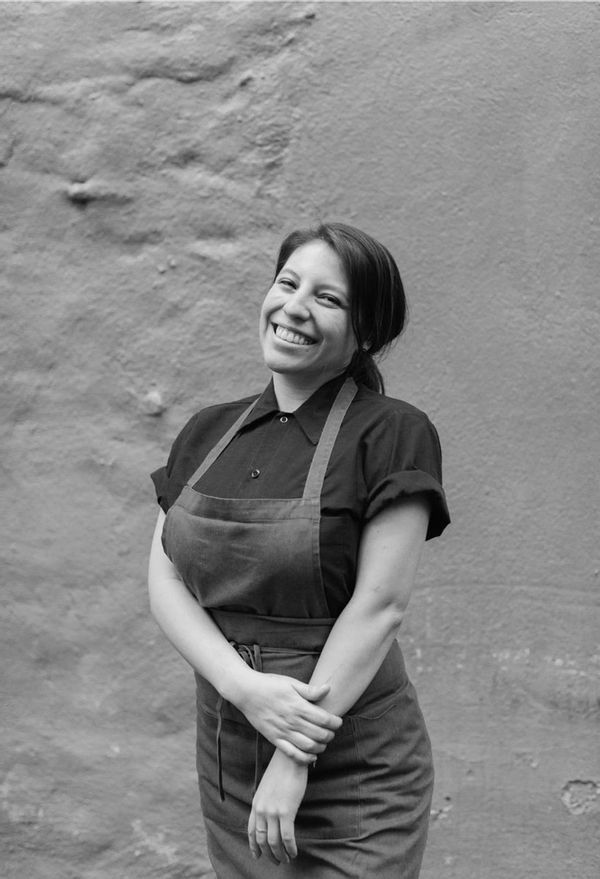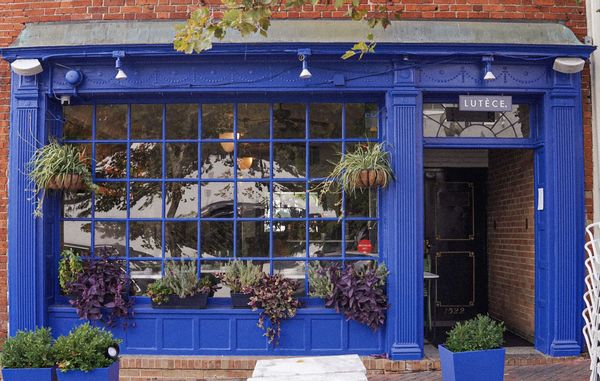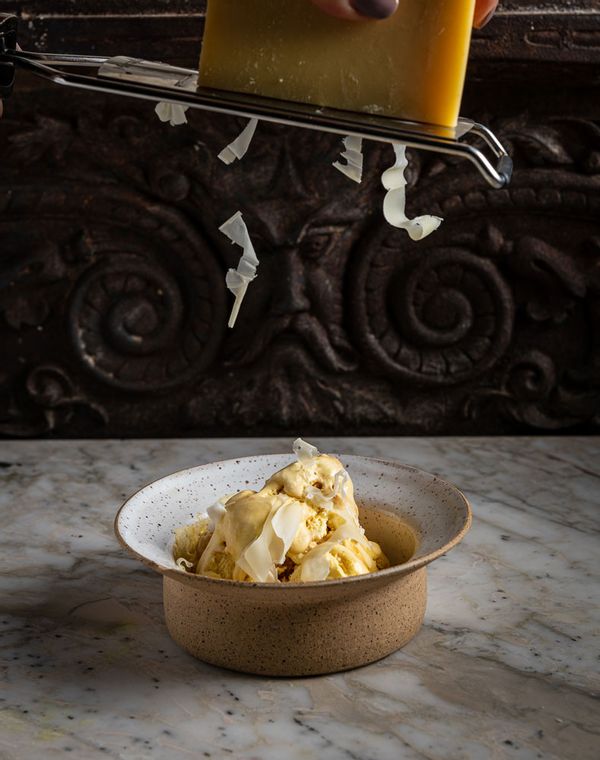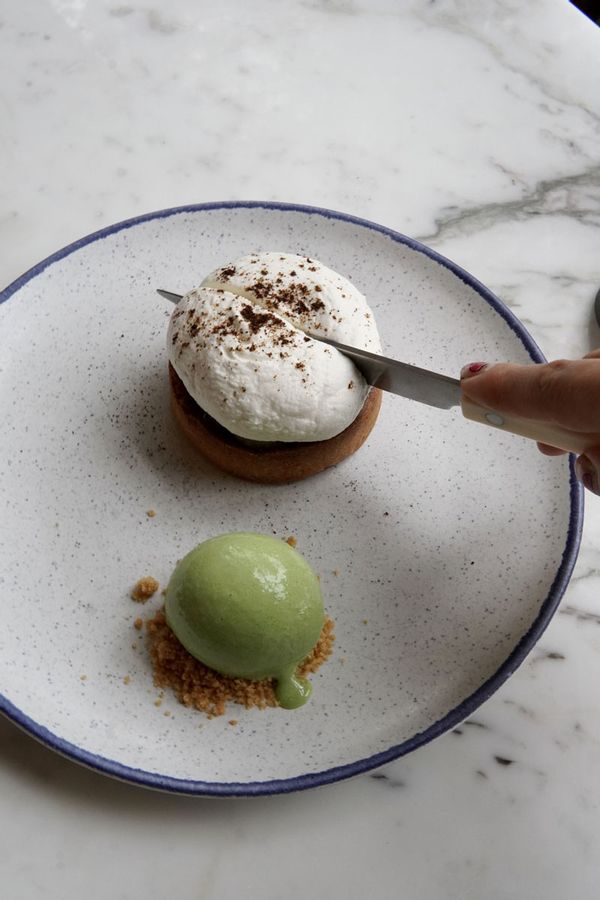
Back in April, I visited a restaurant in the Georgetown neighborhood of Washington, D.C. (one of my favorite food and restaurant cities in the country) that knocked my socks off.
There, I had one of the most outrageous desserts I've ever had, which combined some of my favorite things (aged cheese, honey and semifreddo, which is a "semi-frozen" Italian dessert that is basically an un-churned approximation of ice cream).
This dessert was beguiling and has truly been dancing in my head ever since.
Mind you, the rest of the meal was sensational, as well — but the semifreddo just really tickled my fancy (which I'm sure you've deduced by now). I couldn't recommend it enough.
I was so taken with the dessert that I decided I must speak with the genius behind it. Chef Isabel Coss is the award-winning pastry chef at Lutèce, which is a New York Times 2022 Best Restaurant and is also spoken highly of by Michelin. We spoke about her favorite dishes growing up, her ascension in elite kitchens at top restaurants, her current position at Lutèce and what she's looking forward to in the future.
The following interview has been lightly edited for clarity and length.
You learned to bake from your abuela — can you tell me more about that?
I didn't learn to bake from her, but cooking with her when I was younger definitely inspired me to get into the food world. She is an amazing cook that is very proud of her tomato red rice, her mole made with burnt chiles (not too sweet and not too spicy, just perfect!) and her tamales "canarios," which is a sweet corn paste and rice flour that feels more like a vanilla cake than a traditional tamal. What I loved most about cooking with her was the incredible pride and love she shows in her dishes, whether she's cooking something simple or making a sauce over the course of three days.

When or how did baking/pastry go from a "hobby" to a potential career?
I started cooking in Mexico City. My first job was in the kitchen of Pujol as a bread baker when I was just 18 years old. I was so young and inexperienced and I honestly had no idea why they hired me or what I was doing! I was just following recipes someone else made. With some luck, repetition and lots of hard work I started grasping how bread worked, how temperature affected it and how to transform flour into something fluffy, crunchy and very addictive! It was a rewarding process and suddenly yeast became a friend and not an enemy. I was hooked and I couldn't imagine doing anything else. I fell in love with kitchens and I understood that cooking was a language for me. Food was my creative force.
What are some of the biggest differences between Mexican baking techniques vs. French pastry-making?
Mexican baking started with the wheat brought by the Spanish, followed by techniques that arrived with French invasions in Mexico in the 1800s. The funny thing is, that conflict became known as "The Pastry War" because a French baker started it by searching for reparations after his bakery in Mexico was ransacked. It led to 30 years of conflict between Mexico and France.
So, historically, the techniques between the two nations' pastries are not very different. The key and magic in the technique is under the indigenous hands that with different ingredients and creativity can invent a delicious new type of baking, with hundreds of new shapes and new flavors. For me, Mexican baking has the French techniques as a base but is constructed and presented in a more fearless, colorful, way.

Prior to Lutece, where else have you worked?
After living in Mexico City, I moved to New York City to cook. I worked under Lauren and Alex Stupak, both pastry geniuses at Empellon. That's where I learned most of what I know about baking–they sparked my creativity and taught me how to be a pastry chef.
After Empellon, I joined the team at Agern, a Danish restaurant with an amazing Icelandic chef named Gunnar Gilson. He taught me the Icelandic and Nordic way, how to translate your own culture and food into a delicious setting while respecting the region you are in.
After working at Agern I became the executive pastry chef of Cosme, an incredible Mexican restaurant that was led by the super talented Chef Daniela Soto-Innes. It was one of the most difficult and most rewarding jobs I ever had. Daniela taught me how to be a chef, how a restaurant is a home and that nurturing and investing in the team is the best way to build a culture of care and love around us.
After those incredible 12 years in New York City, I moved to DC following love and joined the beautiful Georgetown neo-bistro called Lutèce with my husband Matt Conroy as the Executive Chef.

I had a stunning dessert at Lutece a month ago: the honey semifreddo with comte and honeycomb. Could you tell me about the recipe development of that dessert? (also the cod with farro, clams and green garlic was the best fish dish I've had in years *and* the non-alcoholic drink was truly stupendous, so cheers all around!)
I'm glad you had a great time. What we do at Lutèce is a combination of talented humans that all communicate best through food and drink.
The honeycomb semifreddo is a revisitation of a traditional French cheese plate with honey and cheese. We all know that combination, but now you can see it through my eyes, with a Mexican influence that adds a fun, delicious and new twist.
The honeycomb semifreddo is made with honey from an Amish farm in Pennsylvania that is just as precious as the 18-month aged comte cheese from France that we shave on top of it. This combination creates a sweet, savory dish that is technically fun but super approachable to all.
What would you love to see as your next steps?
I just want to make beautiful desserts and tacos all day! Haha
Do you have a favorite Mexican dessert or conversely, a favorite French pastry?
TOO MANY! Lately I'm obsessed with bolillos, a savory bread used in everyday life or for tortas — it's the equivalent of a French baguette. But my all-time favorite has to be a tres leches cake garnished with peaches or berries — I can eat that any day of the week.

What is the dessert you've conceived that you're the most proud of?
Right now, I'm very proud of the honeycomb semifreddo. I don't think I can take it off the menu as it has become a guest favorite too and I don't want to start a "Pastry War" all over again!
What are some simple, beginner-friendly Mexican or French desserts that someone interested in pastry or baking might want to try out?
A French dessert that is very underrated but really easy to prepare and make it your own is a Financier. It is a small cake baked in the shape of a rectangle like a gold ingot that uses brown butter and flour (which you can easily substitute for a hazelnut flour or coconut flour instead). After folding in some egg whites, you can bake the batter and it will create a soft cake full of flavor.
What is your dessert ideology? What do you think makes for a truly special sweet offering or ending to a meal?
Desserts need to tell a story. Sometimes they tell my own, sometimes they tell historical stories like grains that travel with immigrants around the world or the story of a farmer's hard work in growing the delicious fruits you are eating.
Desserts need to be technical, too, whether it be a hand roll puff pastry, a dehydrated tuile or a beautifully-cut strawberry.
Above all, desserts need to be fun and delicious and make you want to smile and share with your loved ones.
You can visit Lutèce at 1522 Wisconsin Ave. NW, Washington, DC.





.png?w=600)

